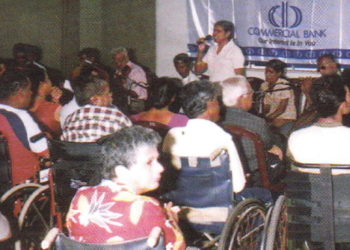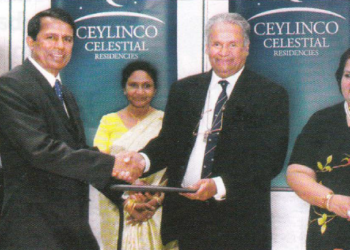By Shiron Gooneratne I Assisted by Anisha Niyas

Graham Ward is the president of the International Federation of Accountants (IFAC). Ward was elected as the president of IFAC in 2004. He served on the IFAC board from 2000 to 2004. During this period, he helped create the Task Force on Rebuilding Public Confidence in Financial Reporting and developed its final report. He is currently a senior partner within the Global Energy and Utilities Group at PricewaterhouseCoopers in the UK.
While on a brief visit to Sri Lanka, Business Today spoke to Ward on what IFAC is, the current state of professional accounting, recent corporate financial scandals, and the way forward as well as good corporate governance and the emerging role of the practicing accountant.
What are the primary activities of IFAC?
The International Federation of Accountants works in a number of different fields -all of which are united by one mission – which is to serve the public interest by strengthening the international accountancy profession. We do this through the setting of high-quality standards, by promoting international convergence to those standards and by speaking out on public interest issues where the expertise of accountants is most relevant. IFAC sets standards for global accountancy in a number of different areas worldwide. We set standards for international auditing and assurance, for education as well as ethics through our various standard boards. It is very important to realize what affects professional accountants in public practices, especially in relations to working in business, government and academia. So IFAC work is comprehensive applications. We also set accounting standards for governments through international public sector accounting standards. Although we set accrual-based accounting standards for public sector accounting we realize the challenges that many governments will have to implement in terms of resource available. We have also promoted a comprehensive cash basis set of international public sector accounting standards. That is another area of activity for IFAC. In February 2004, an International Public Interest Oversight Board (PIOB) was established in conjunction with the international regulatory community and other international institutions. This was done to demonstrate that we are carrying out these activities in the public interest. There are eight full members and two observers on the board. The full members were appointed by the International Organization for Securities Commission (IOSCO), the International Association for Insurance Supervisors (WS), by the Basel Committee on Banking Supervision, and the World Bank. The European Commission appointed the two observers and the whole piece was put together with the support of the Financial Stability Forum (FSF). The FSF has recognized international standards on auditing, de,·eloped by the IFAC International Auditing and Assurance Standards Board, as one or the 12 key sets of standards if financial stability is to be achieved through out the world. What the PIOB does is co-approve the due process of our aucliting, ethics and education standards. I am glad to say that the due process was approved in September 2005. The PIOB approved the membership of the IFAC auditing and assurance, ethics and education standard-setting boards at its meeting in December of last year. It will comment publicly if it believes that any of the boards have not followed that due process. If any of the performances of the members of the standard setting board is below par, then it can recommend that they be removed from office and substitutes are put into place.
In addition, the board can request what should be added to the the agendas of any other of the boards for public interest or for other reasons as well. The board has a comprehensive set of responsibilities.
That is key when setting standards in public interest, which is what IFAC does. It is important that the public feels confident that the right processes are in place and the standards are set keeping public interest in mind. In terms of transparency, our due process is unbeatable among standard setters around the world. Individuals can have access to detailed agenda papers of standard setting boards through our website. Individuals also have access to the work the task forces are doing as well as the detailed minutes of the meeting.
If an individual is unable to attend a meeting of the International Auditing and Assurance Standards Board (IAASB) but want to know the details then one can listen to the tape recordings online. This is available on the IFAC website – www. ifac.org. I should warn you about the meetings though, they last for a total of five days. They are indexed in terms of recordings so one can focus on individual preferences. We also have Consultancy Advisory Groups (CAG), which include people who are nominated by the users of the standard. For example, the IAASB, which is a CAG comprises of organizations in investment, management, investment analysis, corporate governance organizations, stock exchanges, areas of accountancy and various regulators.
David Demand, an Independent lnve tment Analyst who was the President of the Financial Analysts Association on an international basis, chair the IAASB CAG. He has the ricll to come to meetings of the IAASB and ha the opportunity to make he \iew of the consultants group own at the e meetings. We have three public members of the IAASB- two of them are Auditor Generals and the other is an academic. They are full members who take a full part in the work of the boards. It is not only the accountants drawn from member bodies that are setting standards for their colleagues in the profession. People who play a full part in the standard setting process and outside of that community also have a role to play. At meetings we have representatives who are nominated by the Public Company Accounting Oversight Board of the United States, the European Commission and the Japanese Service Agency. They do not have the right to vote but they have the right to speak. So you can see tremendous transparency associated with a lot of work and effort. They make sure that public interest is taken into consideration at every necessary stage.
What’s the current size of membership of lFAC?
IFAC has a 163 member bodies that are headquartered in over 120 countries around the world. If you look at the members of those member bodies they represent over 2.5 million accountants living and working around the world.
Considering the rapid changes, which has taken place in business in an unprecedented way, how would you define the emerging role of the practising accountant as well as the unpracticing accountant?
The role of practicing accountants is intimatelv tied to two things – one is creating ·an inve tment climate of trust, which ensures the development of good financial statement and the other is the creation of wealth – helping and facilitating companies to be successful, to generate new projects and new employment. Most of the guidance we offer, considers the ethical, audit and educational standards and their implications for inclividual accountants and the profe ion as a whole. We i ue pecific guidance in relation to activities of professional accountants in business. Not everyone knows what these accountants do, therefore we published ‘The Role and Domains of Professional Accounting in Business.’ In January 2006, the POIB Committee also issued an exposure draft. This is a document about how to set corporate codes of conduct and the role of professional accounting in business.
How does IFAC help those members who work in small business or small accounting practices?
We look at the constituency of small and medium practitioners. We make sure that we have a special committee that deals with this. The committee feeds into the IAASB, and the IFAC Ethics Board so the SME viewpoint is on their agendas. It is important to make sure that this is taken into account and that the right standards are set. IFAC Professional Accountants in Business Committee is also establishing an electronic information exchange for our professional accountants in business. One of the features of being in a small business is that one is not surrounded by colleagues to go to for help or share experiences with. We want to have information exchanges – which will enable people to benefit from the knowledge and experiences of others. Also there will be a provision of research facilities, articles, books, and standards so accountants have a ready source of information. We are also looking at commissioning someone to write implementation guidance for audits of small and medium sized enterprises. That is expected to come out in late 2006. What this guidance is looking at is how to apply the IAASB’s standards specifically to the audit of SME’s.
What should be the key attributes of tomorrow’s accountant?
The key attribute to tomorrow’s accountants is the same as that of today’s accountant- integrity. IFAC has three values which it applies in terms of its own board, staff and member bodies – integrity, transparency and expertise. The accountant of the future needs to understand that people look to us for trust. This is especially true in terms of the way we help organizations, assist in wealth creation, and the way we prepare and audit financial statements. This requires integrity and a firm focus on the public interest on the works we are carrying out.
The primary role of the auditor is to form an independent opinion on financial statements. However considering the recent financial scandals in Enron and World Com there has been concern expressed by the public about the independence of the auditor. What is the role IFAC has played to address this?
We have done a number of things . In 2001 we established an independent task force shortly after the Enron scandal broke. John Crowe, the former Governor of the Bank of Canada, who has served as the chairman of the Central Bank Governors Committee chairs this task force. What was looked at was how to restore confidence in financial reporting and the focus was on objectivity and independence. The financial supply chain starts with the clerks in the company and goes on to the corporate management, directors, auditors then out to the world -with people who deal with international public relations and also addresses the role of groups such as bankers and lawyers who provide advice to company management. If you want to have high quality trust in financial reporting, all of these parties need to do the right thing because it is a chain and like any other chain it is strong as it weakest link.
You need to have codes of behaviour that is followed by all of parties and establish whether or not codes of behaviour are being followed properly. We established a set of financial obligations, which codify the relationship between IFAC and other individual institutions such as the Institute of Chartered Accountan of Sri Lanka (ICASL). There are seven obligations – five of them deal with requiring member bodies to se standards which follow the ones set by IF AC or the IASB as the case may be. The strengthening of the standard setting process is related to auditing, ethics and education. This was another of the plans that we were putting into place when the scandals came out. As part of responding to John Crowe’ s report, The Professional Accountants in Business Committee is also looking at preparing good practice guidance for professional accountant in business in terms of what they should do. Interestingly enough management of the accountancy institutes came to us and asked why all our focus was on auditing. If we got the accounts right in the first place it wouldn’t have mattered if there were a rotten audit because the accounts would have been right. Drawing to an analogy with motor manufacturing, you cannot say the production line can behave at random because the factory will put it all right at the end of the day. We actually insist that the quality has to be built in from the whole design of the product and right through the manufacture and inspection of the product.
We have got to get that right. In fact we are in the course of starting a new IF AC project to find more precisely what is the responsibility of everybody in that supply chain and to ensure that they are getting the best quality guidance. The IAASB issued a standard on quality control and that is an important aspect of the whole piece. I , ·-it member institutes and very often I peak to regulators and bankers as well as members of the gm·emment. I encourage support for the accountancy profession as part of the, ·ay of having respect for financial statements.
There are currently a number of plans underway. We are seeing the benefits of that coming through. I speak to the senior partners of firms and encourage them. We have seen a new focus on quality control policies within their firms and that is their number one priority now. There is organization called the Forum, which is associated with IFAC, which has just over 20 of the major international accounting firm networks. One of the things that they do is to ensure that membership is undertaken to follow the standards set by IFAC when setting internal standards of audit and behavior.
What are your views on good corporate governance from a global perspective?
We have seen a new focus from members on corporate governance. John Crowe’s report made recommendations that should be taken seriously and addressed. IFAC has contributed to the new corporate governance guidelines published by the Organization for Economic Cooperation and Development.
Our Professional Accountants and Business Committee reinforces the fact that group corporate governance is absolutely essential. It published a report called ‘Enterprise Governance – Getting the Balance Right.’ The report states there needs to be a balance profitability to be successful, it needs to run ethically, and needs to have a focus on wealth creation. In operations it is important that both of those things are right – it goes through a couple of case studies for different areas and doesn’t require action. This is done in terms of not just looking at the area but also doing something about it.
Some countries take a very proactive approach in introducing legislation in governance as well as for disclosury requirements. Others have issued only guidelines for governance done mainly by the accounting body and the Security Exchange Commission. How would you look at it? What role can IFAC play in networking with governments to legalise some of these guidelines?
IFAC can facilitate information exchanges in this area. The project we have got on the supply chain is the working relation to governance and that would be a benefit. We can support individual member institutes. If I am introduced to government officials or ministers through visits such as this, I can help to reinforce the importance of corporate governance in their minds in conjunction with the leaders of those institutes.
“The key attribute to tomorrow’s accountants is the same as that of today’s accounant – integrity.”
It’s worth bearing in mind that whether you have better guidelines or codes on the one hand, it is partly a question of tradition and culture of the country. The United States incorporates a lot through legislation, while the United Kingdom would take a different approach with legislation at a high level. A combined code on corporate governance issued by the Financial Reporting Council could be used because it takes a comply or explain approach.
It says the main people to be satisfied with corporate governance is the company so you should either comply with the code or you should provide an explanation through the annual report to the investors. If the investors do not accept that explanation then they will take action, which will be. good in terms of persuading the chairman and other members of the board that they should be adopting this.
One of the key priorities many appointing bodies take is to harmonize the accounting frame work and accounting standards. What are your views on this? Why are these initiatives important?
The overall quality of published financial statements depends on high quality preparation and amiiting of the accounts working in tandem. If you have one without the other it won’t produce a good quality for the final product that is required. The key is to develop the product in close association.
IFAC appoints a member of the Standards Advisory Council and the IASB so they do need to be developed in close association – if you don’t have both at high quality then investors are not going to have to reap comfort in the information they need or deserve.
As far as the global convergence is concerned is it near or far?
In a funny way it is both – there is 90 countries that claim to follow International Accounting Standards. There are 70 countries that claim to follow International Accounting Standards on Auditing and there will be more to join that. The European Union (EU) has recently published guideline called the ‘Eight Directives on Company Law’, which will require international standards on auditing to be followed by the 25 member states of the EU. The United Nations states that there are 191 countries overall so there are plenty of other countries to go.
The United States follows national standards while Japan follows both national as well as international standards – those are major economies that still aren’t there so work is being carried out in order to make a convergence in place.
The Chinese government recently has made some positive commitments about convergence to international standards in auditing. We will see more convergences in Chinese standards in the very near future. Within South Asia the Sri Lankan Institutes follow the international standards very closely. The institute in India is following them not quite as closely as Sri Lanka. Given the reach here we are seeing some strong moves in the right direction. IFAC encourages the acceleration of the process.
As far as public sector accounting is concerned are they in line with the new economy, especially in developing countries?
The public sector accounting standards as they are in many countries do not follow the clause-based requirements so there is work to be done. IFAC is at the centre of this work – we set international public sector accounting standards for governments and so far we have set 22 accrual based public sector accounting standards. We also have one cash based public sector accounting tandard to help those countries that are not in a position to adopt a accrual-based system.
Those standards are developed in collaboration with the World Bank. It supports their development and it also takes part in the setting of those standards. The Organization for Economic Coorperation and Development (OECD) and the World Bank, which gets involved in assessing and providing more funds in client countries, have recommended them as well. Announced in December of last year they are in the process of being adopted by EU and the UN. In 2006 the UN and the agencies with them, are planning to have their accounts in accordance with international public sector accounting standards. We are making strong progress but there’s a lot of more to be done.
Finally what’s your message to students who aspire to be accountants?
If you are aspiring to be an accountant then it is the right career choice because being an accountant is very exciting. It is also the core of the economic progress of your country. IFAC believes that a country with a strong accountancy profession equates to strong individual accountants, and that is an essential part of a strong financial infrastructure.
A country is able to access funds at a reasonable rate to support projects in terms of health, education, access to water, energy, supplies. A strong accountancy profession is part of promoting economic growth, promoting economic stability, and also being the central path to the fight against poverty.
It is a very important career choice and I would urge you to follow it through. Also remember that the success of your profession is a success of individuality – reflecting on your integrity and high standards of ethics. It is also important to never lose sight of the core purpose of the profession – acting in public interest.






